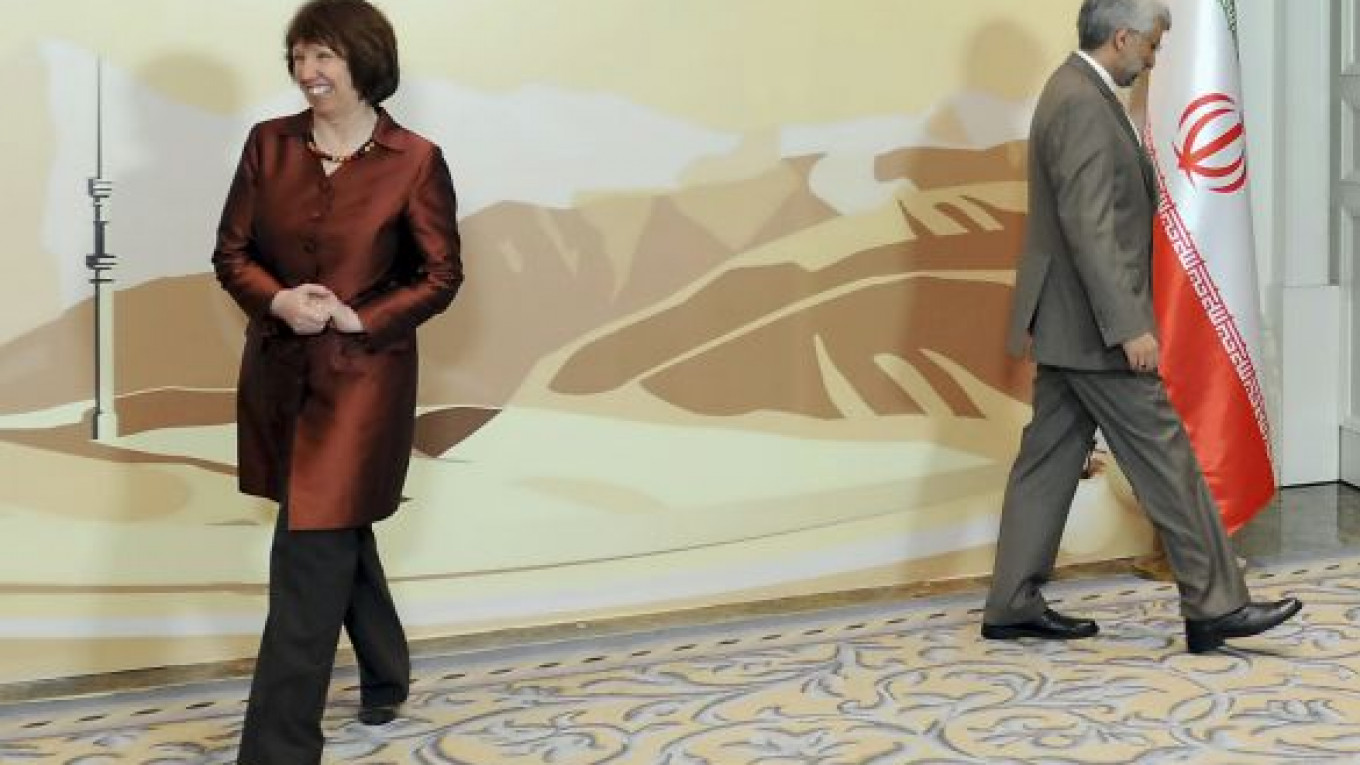ALMATY, Kazakhstan — World powers on Tuesday began their fourth round of high-level talks with Iranian officials as negotiators from both sides pledged to offer new ways to break a years-long impasse over Tehran's nuclear program and its feared ability to make atomic weapons in the future.
A Western official called Tuesday's meeting "useful" and said negotiations would continue Wednesday.
"We had a useful meeting today. Discussions took place this evening; we are meeting again tomorrow," the official said, speaking on condition of anonymity.
Few believe that the latest attempt to reach compromise will yield any major breakthroughs, and negotiators refused to detail what the new solutions might be. Instead, officials described the latest diplomatic discussions as a way to build confidence with Iran as it steadfastly maintains its right to enrich uranium in the face of harsh international sanctions.
"The offer addresses the international concern on the exclusively peaceful nature of the Iranian nuclear program, but it is also responsive to Iranian ideas," said Michael Mann, spokesman for EU foreign policy chief Catherine Ashton, who is leading the negotiations. "We've put some proposals forward which will hopefully allow Iran to show some flexibility."
Mahmoud Mohammedi, a member of the Iranian delegation, said Tehran also is prepared to make an offer of its own to end the impasse, but he refused to provide any details.
The Obama administration is pushing for diplomacy to solve the impasse but has not ruled out the possibility of military intervention in Iran to prevent it from acquiring a nuclear weapon.
A senior U.S. official at the talks said Monday that some sanctions relief would be part of the offer to Iran, but he also refused to detail it. The new relief is part of a package the U.S. official said included "substantive changes."
"Whether you'd call them super-substantial, I'll leave [that] to history," the official said.
The official acknowledged reports earlier this month that sanctions would be eased to allow Iran's gold trade to progress, but he would neither confirm nor deny that they are included in the new relief offer, and he spoke only on condition of anonymity to discuss the sensitive diplomatic talks more candidly.
In a statement before the talks began Tuesday afternoon, Russian Deputy Foreign Minister Sergei Ryabkov said sanctions could be eased only if Iran can assure the world that its nuclear program is for exclusively peaceful purposes.
"There is no certainty that the Iranian nuclear program lacks a military dimension, although there is also no evidence that there is a military dimension," Ryabkov said, Interfax reported.
Officials from both sides have set low expectations for a breakthrough in Almaty, the first time the high-level negotiators have met since a meeting in Moscow in June that threatened to derail the delicate efforts.
The talks are being held in private at a hotel in Kazakhstan's largest city and were deemed so sensitive that reporters were not allowed on the premises Tuesday. Only a handful of television camera operators and photographers were allowed to watch Ashton, who is leading the negotiations, greet Saeed Jalili, secretary of Iran's Supreme National Security Council.
The fact that the meeting is in Kazakhstan, which gave up its nuclear arsenal after the collapse of the Soviet Union in the early 1990s, has symbolic resonance.
A U.S. official said the Central Asian state could serve as a "role model" for the benefits of making "certain choices."
Material from Reuters is included in this report.
Related articles:
A Message from The Moscow Times:
Dear readers,
We are facing unprecedented challenges. Russia's Prosecutor General's Office has designated The Moscow Times as an "undesirable" organization, criminalizing our work and putting our staff at risk of prosecution. This follows our earlier unjust labeling as a "foreign agent."
These actions are direct attempts to silence independent journalism in Russia. The authorities claim our work "discredits the decisions of the Russian leadership." We see things differently: we strive to provide accurate, unbiased reporting on Russia.
We, the journalists of The Moscow Times, refuse to be silenced. But to continue our work, we need your help.
Your support, no matter how small, makes a world of difference. If you can, please support us monthly starting from just $2. It's quick to set up, and every contribution makes a significant impact.
By supporting The Moscow Times, you're defending open, independent journalism in the face of repression. Thank you for standing with us.
Remind me later.






